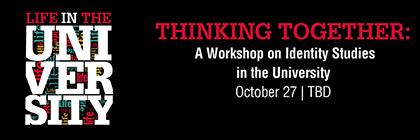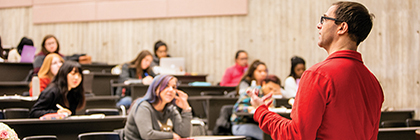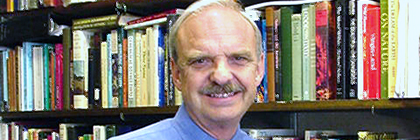A new lecture series that examines the past, present and future of Canadian education will feature the expertise of York Professors Kathleen Gould Lundy and Steve Alsop, York Professor Emeritus Paul Axelrod and several York alumni.
The four-part “Values and Visions in Public Schooling” series, sponsored by the Enoch Turner Schoolhouse Foundations, will present provocative talks on the state of schools. It kicks off on Nov. 14 and follows with events on Nov. 28, Jan. 16 and Jan. 30.
What is schooling for, and how have its goals changed over time? Do Egerton Ryerson’s views of public education in the 19th century have any relevance today?
Are contemporary schools vehicles for creativity or conformity, emancipation or repression, diversity or division, equality or inequity?
How have school design and architecture affected teaching and learning? Why do the arts matter in the classroom?
The sessions feature presentations and panel discussions on these questions and a range of educational subjects. The series is free of charge, and is designed for a broad audience interested in Canadian education.
Speakers include a wide range of educators, academics and community leaders whose work, writing and community engagement have enhanced our understanding of the schooling world. Through informed and critical discussions, the series probes the possibilities and challenges of public schooling.
The series features the following lectures:
• Nov. 14 – What Are Schools For?
Presented by Annie Kidder, executive director of the advocacy organization People for Education; Jonathan Kakegamic, principal of First Nations Junior and Senior School of Toronto; and Steve Alsop, an environmental science educator at York University, this session will kick off with an interactive discussion of the aims of public education. The session will be chaired by historian and York University Professor Emeritus Paul Axelrod, who will set the context by recalling the origins of public schooling in Canada.
• Nov. 28 – Designs for Learning: If the Walls Could Speak…
This session asks how educational design, architecture and the construction of schooling spaces reflect social values, community life and the interests of neighbourhoods. Panellists are Brenda Webster, manager of planning at Waterfront Toronto; architectural historian Shannon Kyles; educational historian and commentator Josh Cole; and Martin Kohn, partner at Kohn Shnier Architects.
• Jan. 16 – From Segregation to Integration?
Public schools, ideally, encourage cultural diversity, social cohesion and equality of opportunity. Panellists in session three ask how fully these goals are being realized. Willa Black, vice-president corporate affairs and social responsibility at Cisco Canada, will chair the discussion, which includes: Jane Griffith, a historian of First Nations residential schooling; Funke Aladejebi, a York University course director who has written on the experience of African Canadians; and Julia Palm, a doctoral student exploring the lives of LGBTQ students and teachers.
• Jan. 28 – Why the Arts Matter
The final session demonstrates the value and dynamism of arts education. York University Professor Kathleen Gould Lundy, an arts educator, leads a group of teachers who, through dramatic performances, illustrate innovative teaching techniques that inspire and engage students.
All sessions will be held at the Enoch Turner Schoolhouse, 106 Trinity St., Toronto, and will begin at 7pm. Everyone is welcome.
Visit the Enoch Turner Schoolhouse Foundation website for information on how to obtain free tickets.







 Titled “Thinking Together: Identity Studies in the University“, the event will bring together faculty and students for a thought-provoking day of conversation about the status of identity in the University.
Titled “Thinking Together: Identity Studies in the University“, the event will bring together faculty and students for a thought-provoking day of conversation about the status of identity in the University.





 The inaugural Don Levy Lecture, in celebration of Jamaica 55, will examine “The Role of the Diaspora in National Development” through a series of panel discussions.
The inaugural Don Levy Lecture, in celebration of Jamaica 55, will examine “The Role of the Diaspora in National Development” through a series of panel discussions.



